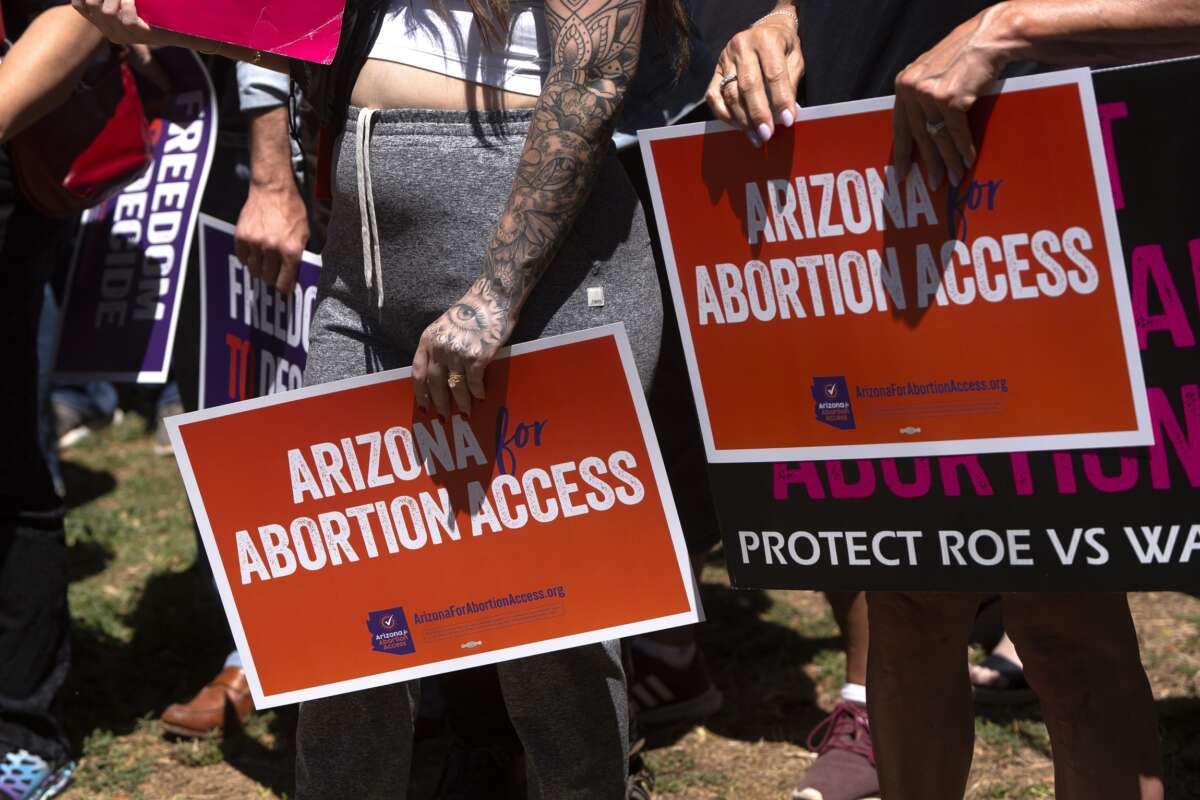On Wednesday, Arizona Republicans blocked efforts in both houses of the state legislature to repeal a territorial-era abortion ban.
This marks the second time this month that Republicans blocked advancement or even consideration of a measure to overturn the incredibly burdensome law.
The law in question — which was passed in 1864, before Arizona was a state — was reinstated last week by the state Supreme Court, which, in a 4-2 decision, upheld its legality despite the fact that it almost completely restricts abortion. Under the statute, a person cannot obtain the procedure at any week of pregnancy and there are no exceptions for rape and incest; abortion is permitted only when a person’s life is at risk due to their pregnancy.
In the State House of Representatives on Wednesday, Democratic lawmakers were joined by just one Republican in an attempt to pass a bill that would repeal the 1864 law. It wasn’t enough to overcome the GOP majority in that chamber, and the bill failed to advance.
Republicans tried to justify the block of the repeal by saying it was made in haste, and that it came too quickly after the state Supreme Court decision.
“The last thing we should be doing today is rushing a bill through the legislative process to repeal a law that has been enacted and reaffirmed by the Legislature several times,” GOP Speaker of the State House of Representatives Ben Toma said.
Notably, the last time the law was reaffirmed by the state legislature was in 1913.
Assistant Minority Leader Oscar De Los Santos (D) condemned Republicans for blocking the repeal bill.
“This issue is very simple: Do we support or do we oppose an 1864 territorial abortion ban that includes no exceptions for rape, no exceptions for incest?” De Los Santos said.
The text of the repeal bill would have repealed the 1864 statute, which hasn’t been enforced since the 1970s, likely reverting the state to the 15-week abortion standard that existed before last week’s ruling.
Over in the State Senate, efforts to start debate on a bill to repeal the 1864 statute also failed on Wednesday — even though a few more GOP lawmakers joined with Democrats to support the process, the Republican majority was still able to delay consideration of such a bill until at least next week, possibly longer.
Rolande Baker, a 72-year-old from Tucson who had traveled to Phoenix to support repeal, expressed deep frustration with the actions taken by Republicans in the state legislature.
“Why won’t these cowards allow the vote to come to the floor? What are they afraid of, that it might just pass? That Arizona just might get ourselves out of the year 1864? Before the end of the Civil War? Before women had a right to vote?” said Baker, who had undergone an abortion when she was 19, when it wasn’t yet legal where she lived.
“Instead of addressing this dire issue, Republicans have repeatedly ignored calls from Arizona communities and refused to repeal the ban,” said Democratic Legislative Campaign Committee National Press Secretary Sam Paisley. “Republican legislators will own the consequences of this devastating ban taking effect.”
Voters in Arizona may have the opportunity this fall to take matters into their own hands, as a voter-led abortion initiative will likely be included on the November ballot.
The proposed constitutional amendment would supersede the 1864 law by establishing a “fundamental right to abortion” up to the point of fetal viability (typically around 22-25 weeks of pregnancy). It would also allow abortion procedures after that time frame in cases of rape or incest, when it is necessary to save the life of a pregnant person, or to protect a pregnant person’s physical or mental health, based on the “good faith judgment” of their care providers.
